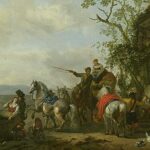“The Moses Option.” Paul Kingsnorth writes against the dangerous allure of activism: “What is the ‘solution’ to our modern ‘problem’? For a start, it is to stop thinking like that, because that is Machine thinking. We do not have a ‘problem’ that can be ‘solved’ by politics or war or top-down civilisational projects. We just have a repeat of a very old and familiar pattern: a turning-away from God, and thus from reality. This ‘problem’ is only ever ‘solved’ by turning back again, and societies can’t do that. Only people can, one at a time.”
“A Farmers’ Revolt is Coming: Labour’s Budget will Destroy Rural Life.” James Rebanks eviscerates the failed farm policies and broken political promises in Britain: “Being ripped off has become a way of life for farmers. Over the past century, the share of our household expenditure that we spend on food has dropped from about 30% to about 8%. But it gets worse — only about 15p in every pound we spend on food goes to the farmer, the rest is captured by supermarkets, processors and other middle-men. My dad, like many other farmers, worked for little more than minimum wage for much of his life, and with dreadful returns on his investment.”
“How to Discern Truth in Our Chaotic Digital Milieu.” I draw from my recent book in weighing different approaches to media ecology: “The fundamental question may not be which media technology will spread truth or untruth, but which posture we should take to allow us to faithfully pursue truth.”
“A Simple Litmus Test for RFK Jr.’s Ideas.” Vinay Prasad works to sift through RFK Jr.’s positions to take stock of what his cabinet post might mean for US policy: “Right now, the media is covering RFK Jr. poorly and unfairly, giving him no credit for ideas that are well within the bounds of discussion. My simple rule makes sense: If other nations are doing it, we should be willing to look into it. And RFK Jr. should not be called a conspiracy theorist for holding that view.”
“Fading Light.” Brian Miller sits on his front porch and reflects on the day (and its larger context): “The world, close and intimate at this moment, seems sufficient. The story told by a dinner guest the night before about a good friend who disowned her for not voting ‘correctly’ feels alien to the light and sounds of this place. The posturing, the incivility, the claims of disaster by this side and that side, the crisis, the tears—all fade away in the now darkening dusk. This I can handle, the work on the farm, my relationship with my partner, the shared decisions about what to do next and, as always, what to do again, as another autumn slides into winter that then morphs into spring.”
“An Opening Day Series, Part 1: Why Consider Hunting?” Taylor Reed describes learning to appreciate the value of hunting: “I had thought hunting created an unnecessary, competitive divide between the natural world and humans. I began to entertain the idea that I had it backwards — hunting might bring the two together, benefiting both.”
“No Porches in Prison: God, Civility, and Redemption.” Micah Watson ponders civility from his experiences teaching prisoners: “Civility strikes me as a secondary virtue, and somewhat anemic, one that rests on more powerful, thick-blooded virtues that depend on something more than the merely natural or human. . . . So rather than offer a robust argument or a ten-point plan about restoring civility, I want to do something more akin to offering a testimony of sorts. It is not so much a deductive argument as a bit of wandering meditation.”
“Choosing the Impossible Love.” Davey Henreckson wrestles with our moral responsibility to cultivate friendships with people unlike ourselves: “Love of enemy—which is what we now find ourselves considering—is an impossible task. At least if we are honest with ourselves. Love of enemy is also perhaps the most distinctive Christian moral imperative. What would it look like if we made friends of enemies? What would it look like if we took on the burden of choosing to befriend those we take to be different from us? Indeed, what would it look like if we decided to cultivate interests, habits, and loves that align not only with our neighbour (a hard enough task) but even with our enemy?”
“Are We All Cyborgs Now?” Aaron Weinacht talks with Joshua Pauling about his new book and how we might live well with technology.
“Cereal City Review.” April DeOliveira, an FPR contributor, is launching a new literary journal focused on place: “We want writing where the place is so integral that the narrative wouldn’t be the same without it. We are looking for stories where conflicts and characters are inseparable from their environments, and poetry that conjures vivid, postcard-like images of distinct locales. We believe that place shapes identity, and we aim to highlight writing that brings these connections to life in compelling and evocative ways.”






